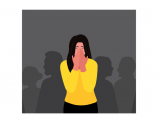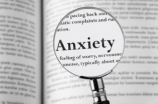How I Learned to Stop Avoiding Life
How I Learned to Stop Avoiding Life

This blog was originally posted on Ten Percent Happier on April 22, 2022 and is reprinted here with permission
I grew up in Brazil, in a little town called Governador Valadares. Early on, my father left us, and it was my mom, my sister and me. Things were challenging. My mom did the best she could, she worked as hard as she could. But I remember how tough things were – there were times when we didn’t have enough to eat. But we kept going.
One morning, after it had been raining through the night, our roof was leaking. As I stepped out of my bed, I stepped in a puddle of water. Worse yet, there was a mushroom growing in it. I remember feeling so overwhelmed. As I got ready to go to school that morning, my anxiety was so high that my stomach ached. So, I asked my mom if I could stay home, and I did. I vividly remember watching something on television and eating a bag of cookies. What I really wanted was for that discomfort to go away, to feel better as fast as I could.
For many years of my life, that's what I did: avoid. When I got uncomfortable, I walked away. I bet my life could have kept going that way had I not moved at age sixteen. My mother really wanted my sister and I to have the possibility of a different life, and so she sent me to leave my grandmother in a much bigger town called Belo Horizonte.
I was scared leaving the comfort of my home to be with my grandmother in a town that I didn't know. So, I fled again. I started to avoid new people. I didn't want to make friends. I didn't want to talk to strangers. After school I came home as fast as possible. And when my grandmother questioned me about why I didn’t invite anyone over, I'd say “I just have to study.”
My grandmother didn't have a college education, but she was really wise. One day, she took me to the mall, and my grandmother, in her very mild manner, said, “let's go talk to that person over there,” pointing at an older gentleman. I was terrified of talking to people, but she didn’t take no for an answer. To this day, many, many years later, I still remember how scared I was of this nice, gentle, older gentleman.
She invited me on these outings often, always insisting we talk with someone new, until after a while, I wasn't scared anymore.
That small act really changed the trajectory of my life. I started to dream. And one of those dreams was to come to the US. Eventually, I found my way to Buffalo, New York, and got into a doctoral program to become a clinical psychologist. That's where I learned the science of how the experience of fight, flight or freeze applies in our day to day lives.
The fact is, we are all biologically wired to protect ourselves from danger. Imagine for a second that there is a big lion right here, right now. What would happen? Within milliseconds the amygdala, in the oldest part of our brain, would signal danger. We don't have to think about this reaction. It's automatic, it's milliseconds. And once it goes on, the heart starts to pound, we tense up, we are ready to fight, flight, or freeze.
Of course, this doesn’t only happen when there’s a lion. Imagine you get an email late at night, perhaps from someone you have been in disagreement with, and the subject line is “we need to talk.” What happens? Well, pretty quickly, your heart's going to pound again, you're going to tense up.
And then, you’re going to want to fight, flee, or freeze.
If you're the kind of person that tends to fight, you're going to react: you might send a quick email back, and momentarily feel a little better. If you’re prone to flee, you are going to retreat so you might shut down your phone and turn on the TV instead. Some of us might completely freeze, you are going to remain in place, perhaps staring at the phone without knowing how to handle the email.
It doesn't matter if it's a lion, an email, or talking to someone new in a strange new city, we will all have this wiring in place. Because it’s so uncomfortable to be with something we perceive as a threat, we’ll all fight, flight or freeze to avoid it. Just like I did as a little girl.
So, how do we rewire our brain to stop avoiding? I’ll be talking about this in detail in the Ten Percent app, on the Teacher Talks podcast. But the first step is to notice that you’re avoiding in the first place, and to notice how you do it. Do you tend to react, maybe getting angry and sending that email? Do you retreat with a glass of wine or a bag of chips? Do you remain frozen and find your brain simply unable to work?
These may not feel like avoidance, but believe me, they are. And noticing that you’re doing it is the first step in changing your behavior.
It turns out that what I learned from my grandmother is what science tells us today. We are all wired for fight, flight, or freeze when confronted by a perceived threat. It’s biologically adaptive if there’s a lion nearby, but in modern life, we need to teach our brains how to step back from those instincts. The good news is that we can do it. With practice, taking one small step at a time, we begin to set ourselves free.
This article is republished from Ten Percent Happier. Read the original article.



















